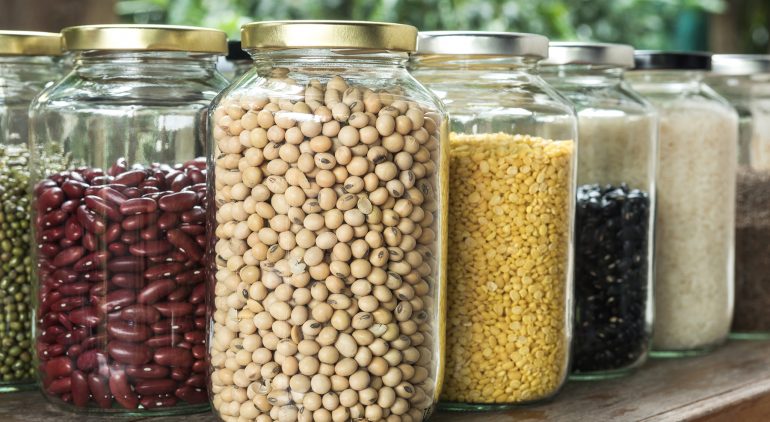
The Bulk Section: Truths and Fun Facts
I cannot think of anything negative about choosing the bulk option when shopping at the Co-op. We are fortunate that our member-owned market offers so many products in bulk, allowing you to buy just the amount you need, as compared to pre-packaged options that often sit around too long and are then thrown away. When you buy in bulk, you will save money, get into some “real food” cooking, be inspired to create your own combinations from soups to snacks, and cut way down on food packaging waste. Some products sold in bulk are locally produced, and most are organic and not genetically modified. Food sold in bulk turns over quickly, so bins are monitored and refreshed regularly.
While most of us know about the herb and spice selection, the wide variety of flours, nuts and seeds, and various grains and legumes in bulk bins, did you know:
- You can purchase just the right amount of safflower or canola oil, vanilla and almond extract, and two varieties of soy sauce from bulk dispensers. Containers are available for sale, but the best option is to bring your own!
- It is possible to buy your preferred amount of shampoo or conditioner, along with dish soap from bulk dispensers.
- If you ask a staff member, they will refill your container with honey or maple syrup at a reduced, bulk price. Also, inquire about 15% bulk discounts sometimes available on case lots.
The variety of choices for prepackaged tea and coffee at the Co-op can be staggering, but there are additional savings to be had in the bulk section. When you select and/or grind coffee from the bulk dispensers, you are charged a price per pound or 16 ounces. While the sale price of prepackaged coffee in grocery stores is often tempting, remember that these bags typically hold 10 to 12 ounces. Also, consider re-using those lined coffee bags available under the coffee bean bins. They are expensive but rugged and can transport your coffee home multiple times.
Probably my favorite bulk buy at the Co-op is peanut butter, especially now with the new nut grinders. There are salted and unsalted peanut options, along with almonds for almond butter. Bring your own container and get a staff member to help you determine its tare weight if you are unfamiliar with this process … you only want to pay for the weight of the nut butter, not the container.
Finally, consider creating your own combinations from the array of products you can purchase in small or large quantities in bulk. For example:
- You can combine dehydrated vegetables, herbs, and legumes to create a meal that is both economical and delicious. A couple of my favorites are Lentil Soup with Carrots and Rosemary, and Lentil Chili, which also contains bulgur for a complete protein, from Arthur Schwartz’s What to Cook When You Think There’s Nothing in the House to Eat. This book is out of print, but grab it if you spot it at a used book sale. It is organized by ingredients and I’ve never had a bad experience with these recipes.
- Make your own snack mixes for school lunches using nuts, seeds, rice sticks, and dried fruits. This can be cheaper than buying prepackaged and you know what is in the snack.
- I’ve discovered that making granola is a very easy process and it makes your house smell great while it is baking in the oven. If you have access to Jane Brody’s Good Food Book, it contains a great recipe that is much lower in fat and sugar than conventional granola but is still nutty and delicious.
- When you need to get something on the table quickly for an evening meal and select some protein and vegetables from the hot bar, consider making these go further with either couscous or bulgur from the bulk bins. These are staples in many ethnic cuisines and require very minimal cooking.
I hope you have some rewarding cooking adventures with novel purchases from the array of bulk foods available at the Co-op!
Louise Vojtisek is a Middlebury Natural Foods Co-op Board Member




